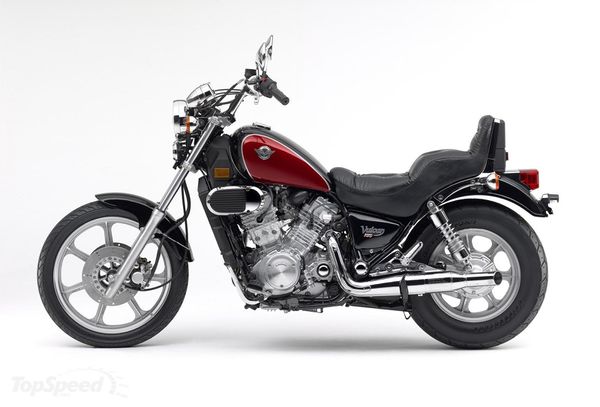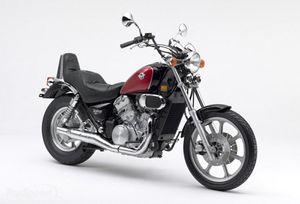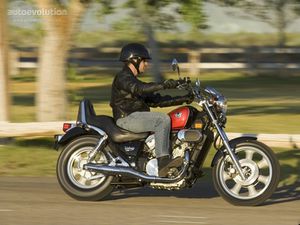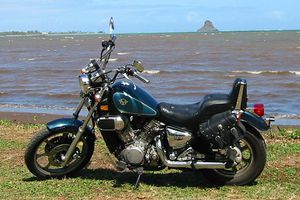Difference between revisions of "Kawasaki VN750 Vulcan"
m |
m |
||
| Line 1: | Line 1: | ||
{{DISPLAYTITLE: Kawasaki VN 750 Vulcan}} | {{DISPLAYTITLE: Kawasaki VN 750 Vulcan}} | ||
| + | {{#seo: | ||
| + | |keywords={{PAGENAME}}, review, specs, owners manual, service manual, guide | ||
| + | |og:image=https://en.enduro.team/images/d/dd/2006-kawasaki-vulcan-750-7_1600x0w.jpg | ||
| + | }} | ||
__notoc__ | __notoc__ | ||
| − | [[file: 2006-kawasaki-vulcan-750-7 1600x0w.jpg | | + | [[file: 2006-kawasaki-vulcan-750-7 1600x0w.jpg | 600px | center | Kawasaki VN 750 Vulcan]] |
| − | + | '''Kawasaki VN 750 Vulcan''' was introduced at the end of 1984 and was sold until 2006. | |
{{Ads_top}} | {{Ads_top}} | ||
| + | |||
| + | ''' Lineup: ''' | ||
| + | * [[Kawasaki_VN750_Vulcan | Kawasaki VN750 Vulcan]] | ||
| + | * [[Kawasaki_VN800_Vulcan | Kawasaki VN800 Vulcan]] | ||
| + | * [[Kawasaki_VN1500_Vulcan | Kawasaki VN1500 Vulcan]] | ||
| + | * [[Kawasaki_VN1600_Vulcan | Kawasaki VN1600 Vulcan]] | ||
| + | * [[Kawasaki_VN1700_Vulcan | Kawasaki VN1700 Vulcan]] | ||
| + | * [[Kawasaki_VN2000_Vulcan | Kawasaki VN2000 Vulcan]] | ||
| + | |||
| + | ''' Main competitors: ''' | ||
| + | * [[Honda_Shadow_750 | Honda Shadow 750]] | ||
| + | * [[Suzuki_VS750_Intruder | Suzuki VS 750 Intruder]] | ||
| + | * [[Yamaha_XV750_Virago | Yamaha XV 750 Virago]] | ||
| + | |||
| + | Kawasaki VN 750 Vulcan was actively exported to the United States and had a good level of sales there. In 1985, the United States imposed increased customs duties on imports of motorcycles over 700 cc. see, which forced Kawasaki to reduce the volume of the '''Volcano''' to 699 cubic meters. see and rename it to '' Kawasaki Vulcan 700 ''. However, a year later, in 1986, customs restrictions were lifted and the original version with an engine capacity of 750 cc was supplied to the US market. see. Naturally, such changes were also reflected in the name of the model, which was now called the '''Kawasaki Vulcan 750'''. | ||
| + | |||
The model may also be called '''Kawasaki VN 750 Twin'''. | The model may also be called '''Kawasaki VN 750 Twin'''. | ||
The main feature of the Kawasaki VN 750 Vulcan is a liquid-cooled V-twin 2-cylinder engine that produces 66 hp. power and 65 Nm of torque, which makes it perhaps the most powerful motorcycle in the Cruiser class for its engine size. In addition, the data from the dino-stand shows that the declared characteristics of the motor are underestimated by 8-10% of the real values of power and torque. This fact indicates that either Kawasaki did not have enough experience in building classic cruisers, and therefore, out of habit, created a motorcycle with sporty characteristics (the "red zone" of the engine starts at 8500 rpm), or this step was deliberate, and the appearance of such a powerful bike was due only to the desire to bypass competitors, but then it looks illogical to underestimate the real characteristics of the motor. | The main feature of the Kawasaki VN 750 Vulcan is a liquid-cooled V-twin 2-cylinder engine that produces 66 hp. power and 65 Nm of torque, which makes it perhaps the most powerful motorcycle in the Cruiser class for its engine size. In addition, the data from the dino-stand shows that the declared characteristics of the motor are underestimated by 8-10% of the real values of power and torque. This fact indicates that either Kawasaki did not have enough experience in building classic cruisers, and therefore, out of habit, created a motorcycle with sporty characteristics (the "red zone" of the engine starts at 8500 rpm), or this step was deliberate, and the appearance of such a powerful bike was due only to the desire to bypass competitors, but then it looks illogical to underestimate the real characteristics of the motor. | ||
| − | '' | + | ''' Modifications: ''' |
* '''Kawasaki VZ 750''' is the Japanese name for a motorcycle. | * '''Kawasaki VZ 750''' is the Japanese name for a motorcycle. | ||
* '''Kawasaki VN 750 (Vulcan 750)''' is the name of the motorcycle for the US market. | * '''Kawasaki VN 750 (Vulcan 750)''' is the name of the motorcycle for the US market. | ||
| Line 15: | Line 35: | ||
The model was produced until 2006, after which it was discontinued. In 1995, the [[Kawasaki_VN800_Vulcan | Kawasaki VN 800 Vulcan]] entered the market as a replacement for the obsolete Kawasaki VN 750 Vulcan, although the latter also continued to be sold in parallel, particularly in the US market. | The model was produced until 2006, after which it was discontinued. In 1995, the [[Kawasaki_VN800_Vulcan | Kawasaki VN 800 Vulcan]] entered the market as a replacement for the obsolete Kawasaki VN 750 Vulcan, although the latter also continued to be sold in parallel, particularly in the US market. | ||
| − | |||
| − | |||
| − | |||
| − | |||
| − | |||
== Photos == | == Photos == | ||
Revision as of 19:01, 12 July 2023
Kawasaki VN 750 Vulcan was introduced at the end of 1984 and was sold until 2006.
Lineup:
- Kawasaki VN750 Vulcan
- Kawasaki VN800 Vulcan
- Kawasaki VN1500 Vulcan
- Kawasaki VN1600 Vulcan
- Kawasaki VN1700 Vulcan
- Kawasaki VN2000 Vulcan
Main competitors:
Kawasaki VN 750 Vulcan was actively exported to the United States and had a good level of sales there. In 1985, the United States imposed increased customs duties on imports of motorcycles over 700 cc. see, which forced Kawasaki to reduce the volume of the Volcano to 699 cubic meters. see and rename it to Kawasaki Vulcan 700 . However, a year later, in 1986, customs restrictions were lifted and the original version with an engine capacity of 750 cc was supplied to the US market. see. Naturally, such changes were also reflected in the name of the model, which was now called the Kawasaki Vulcan 750.
The model may also be called Kawasaki VN 750 Twin.
The main feature of the Kawasaki VN 750 Vulcan is a liquid-cooled V-twin 2-cylinder engine that produces 66 hp. power and 65 Nm of torque, which makes it perhaps the most powerful motorcycle in the Cruiser class for its engine size. In addition, the data from the dino-stand shows that the declared characteristics of the motor are underestimated by 8-10% of the real values of power and torque. This fact indicates that either Kawasaki did not have enough experience in building classic cruisers, and therefore, out of habit, created a motorcycle with sporty characteristics (the "red zone" of the engine starts at 8500 rpm), or this step was deliberate, and the appearance of such a powerful bike was due only to the desire to bypass competitors, but then it looks illogical to underestimate the real characteristics of the motor.
Modifications:
- Kawasaki VZ 750 is the Japanese name for a motorcycle.
- Kawasaki VN 750 (Vulcan 750) is the name of the motorcycle for the US market.
Other features of the Kawasaki VN 750 Vulcan include a steel frame, cardan drive, dual disc brakes in the front and rear drum, hydraulic lifters and simple suspension in the form of a conventional telescopic fork in the front and a double shock absorber in the rear.
The model was produced until 2006, after which it was discontinued. In 1995, the Kawasaki VN 800 Vulcan entered the market as a replacement for the obsolete Kawasaki VN 750 Vulcan, although the latter also continued to be sold in parallel, particularly in the US market.
Photos
Specifications
Specifications Kawasaki VN 750 Vulcan:
| Model | Kawasaki Vulcan 750 (VN750 Twin) |
|---|---|
| Motorcycle type | cruiser |
| Release year | 1984-2006 |
| Frame | steel tubular |
| Engine type | 2-cylinder, 4-stroke, V-shaped |
| Working volume | 749 cc cm. |
| Bore / Stroke | 84.9 x 66.2 mm |
| Compression ratio | 10.3: 1 |
| Cooling | liquid |
| Number of valves per cylinder | DOHC, 4 valves per cylinder (with hydraulic clearance compensators) |
| Fuel supply system | Carburetor, 2x Keihin CVK34 |
| Ignition type | transistor |
| Maximum power | 66.0 h.p. (48.5 kW) @ 7500 rpm - basic version
68.0 h.p. (50.0 kW) @ 7500 rpm - Canadian and South African versions 50.0 h.p. (36.8 kW) @ 7500 rpm - German version |
| Maximum torque | 64.7 Nm (6.6 kgf * m) @ 6,000 rpm - basic version |
| Gearbox | 5-speed |
| Drive type | cardan |
| Front tire size | 100 / 90-19 57H |
| Rear tire size | 150 / 90-15 74H |
| Front brakes | 2 discs, 226 mm, 1-piston calipers |
| Rear brakes | drum |
| Front suspension | 38mm telescopic fork, 150mm travel
38 mm telescopic fork (pneumatic), 150 mm travel - VN700-A1, VN750-A1-A4 |
| Rear suspension | linkage with two shock absorbers (adjustable preload), stroke - 90 mm |
| Motorcycle length | 2310 mm |
| Motorcycle width | 860 mm |
| Height | 1235 mm |
| Wheelbase | 1585 mm |
| Saddle height | 750 mm
735 mm - North American version |
| Acceleration to 100 km / h | |
| Maximum speed | 180 km / h |
| Fuel tank capacity | 13.5 l |
| Motorcycle weight (dry) | 223 kg
219 kg - North American version |
| Motorcycle weight (curb) | 241 kg
236 kg - North American version |
Documentation



